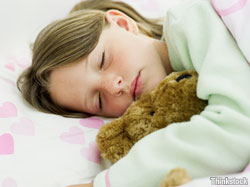
(ARA) – Any parent knows a child’s cough can render you feeling helpless at 3 a.m. and keep the entire family from being well-rested. Moreover, doling out the remedy can escalate into a wrestling match ending with you wondering about the dangers of giving more due to spillage. Fortunately, a little information can reduce the household stress from this common problem.
According to the Mayo Clinic, the common cold is the number one reason why children miss school. Children catch six to 10 colds a year and cough is a major symptom. In fact, it’s estimated to be the symptom that most commonly prompts patients to see a doctor. “A cough is a symptom, not a disease,” says Dr. Jim LaValle, a clinical pharmacist, author of “Green Immunity Boosters,” and founder of LaValle Metabolic Institute. “Among the many mechanisms of defense and adaptation we have, coughing is one of the most misunderstood.”
“In healthy people, it is a very useful reflex that keeps our air ducts clear from particles or excessive mucus so our breathing is protected,” he says. “However, not only does it spread germs but it also interrupts sleep. This further weakens the immune system, making us more vulnerable to a secondary infection.”
LaValle offers some advice for parents treating kids’ coughs:
* Stay hydrated and settle down. To start, parents can encourage kids to drink water or other healthy liquids to thin mucous secretions, thereby soothing a cough, and discourage kids from over-exerting themselves when they have fever, aches or a cough that produces phlegm.
* Honey: Myth or truth? Grandma was right according to a study published in the December 2007 “Archives of Pediatrics and Adolescent Medicine.” A teaspoon of honey before bed seems to calm children’s coughs and helps them sleep more soundly. Honey coats the throat to soothe irritation and is rich in infection-fighting antioxidants. It also spurs saliva production, which can help thin out mucus. Refrain from giving honey to children younger than 1 year of age.
* Opt for an expectorant, rather than a suppressant. Coughs associated with colds should be treated with an expectorant to clear out mucus. A productive cough is the body’s way of clearing out mucus. An expectorant encourages the body to get rid of the phlegm quickly and get over the coughing. Suppressants on the other hand suppress the body’s natural desire to heal.
* Read the labels. Manufacturers of decongestants, antihistamines and cough suppressants recently have voluntarily relabeled these medications, instructing parents not to use them in children younger than 4 years of age. The move followed a U.S. Food and Drug Administration panel questioning the safety and efficacy of these medications’ use in children younger than 6 years of age.
“One of the safest and tastiest over-the-counter options I recommend for kids is a cough syrup that combines honey and homeopathic medicines, Children’s Chestal,” says LaValle. “It doesn’t contain any of the ingredients in question by the FDA. Instead of working against the body as a suppressant, it works naturally with the body to make any type of cough more productive for a speedier recovery.”
From the makers of Oscillococcinum, a flu medicine relied upon by families throughout the world for 65 years, Children’s Chestal is safe for children 2 years of age and older and has no risk of overdosing. The sweet, kid-friendly honey base coats and soothes the throat while the blend of safe homeopathic medicines works on loosening chest congestion. It calms those dry, fitful coughs at bedtime so they don’t prevent sleep, but without drowsy side effects for the day.
* Know when to see a doctor. Most coughs subside on their own within a week to 10 days. Coughs that linger longer or are associated with coughing up colored phlegm or blood, wheezing, temperatures higher than 101 degrees and drenching night sweats can be symptoms of a more serious illness like pneumonia or asthma.





